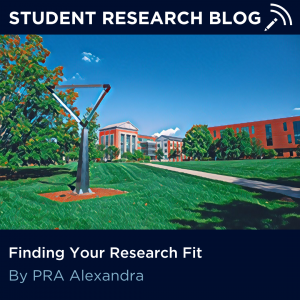By Alexandra Goldhamer, Peer Research Ambassador
 With all of the research opportunities available at UConn, it can be difficult to determine which experience would be best for you. One of my majors, molecular & cell biology, is more in line with bench research. My other major, human rights, relates more to qualitative research. Further, my minor in mathematics sparked my interest in quantitative research. I have diverse passions that I have been able to explore through coursework on different subjects. However, when participating in research during the academic year, it is important to commit your time and resources to a particular project in a particular lab. This allows for your knowledge, strengths, and techniques to grow in a particular subject that will inform your particular career goals. So, how do you know what’s the best fit for you?
With all of the research opportunities available at UConn, it can be difficult to determine which experience would be best for you. One of my majors, molecular & cell biology, is more in line with bench research. My other major, human rights, relates more to qualitative research. Further, my minor in mathematics sparked my interest in quantitative research. I have diverse passions that I have been able to explore through coursework on different subjects. However, when participating in research during the academic year, it is important to commit your time and resources to a particular project in a particular lab. This allows for your knowledge, strengths, and techniques to grow in a particular subject that will inform your particular career goals. So, how do you know what’s the best fit for you?
Attend conferences and workshops
Early on in my undergraduate career, I attended both the Mathematics Continued Conference and some of the presentations that were put on by the STEM Seminar Series that focused on molecular biology. I knew I was interested in these topics and this was confirmed by reading about faculty members’ research interests on their department websites. During both of these experiences, I evaluated 1) how interested I was in each of the topics, 2) what it would mean to make small contributions to these fields, and 3) if I would enjoy the day to day tasks that lead to the end goal of small discoveries. I found myself fascinated by the biology presentations, and was intrigued by the fact that any contribution in this field could potentially have an impact on clinical outcomes. Although I was still curious about what the day to day experience would entail.
Ask undergraduate researchers about their experiences
When I was a first-year student I had a Peer Allies Through Honors (PATH) mentor that was involved in undergraduate research. She had a very positive experience with research and answered my inquiries with enthusiasm, which got me inspired to have a similar experience of my own. There were many mentors in PATH that shared her experiences and explained what their day to day research experience was like. It fascinated me that their work brought the concepts I had learned about in coursework alive, especially when their research projects were in the realm of translational medicine.
Have conversations with faculty about their research projects
Having conversations with faculty about their specific research is a great way to learn about their projects, and some that you may be able to contribute to. Having these conversations offers unique perspectives and can spark your interests past what you may learn in a general seminar or by asking other undergraduates about their experiences. These conversations should always precede asking to join a faculty member’s lab; they are mutually beneficial discussions where you will be able to learn about how you can contribute to their lab, and how their research can benefit you as a student as well. Following these conversations, there will be some research labs/opportunities that you will be interested in over others and this is the time to reach out to those faculty members about potential openings in their labs for undergraduate students. It is important to not be discouraged if a certain opportunity does not work out; your unique talents and strengths could be well suited for a different research opportunity.
Determining which type of research best suits your career goals, personal strengths, and interests can be challenging. Attending seminars and conferences, meeting with faculty members, and engaging in conversations with established undergraduate researchers will allow you to gain insight into who you want to be as both a researcher and student.
Alexandra is a senior majoring in Molecular & Cell Biology and Human Rights. Click here to learn more about Alexandra.